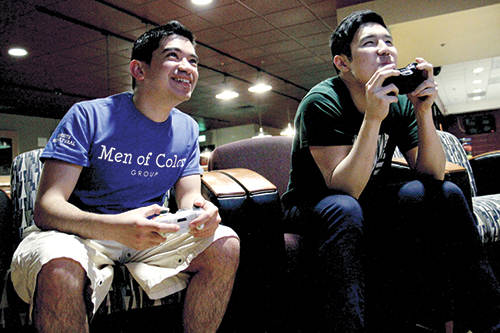I never thought that I would call myself a gamer. It’s just that the word “gamer” has so many connotations. During my high school years, enduring countless hours of others’ conversations about World of Warcraft and Final Fantasy XI gave me the impression that gamers were nothing more than pimply males who sat in front of their computers for days at a time while all but forgetting what the outside world looked like. Boy, was I wrong.
Gaming evolved

I never thought that I would call myself a gamer. It’s just that the word “gamer” has so many connotations. During my high school years, enduring countless hours of others’ conversations about World of Warcraft and Final Fantasy XI gave me the impression that gamers were nothing more than pimply males who sat in front of their computers for days at a time while all but forgetting what the outside world looked like. Boy, was I wrong.
Since I’m not a computer gamer, next-gen console gaming innovations were lost on me when they first hit stores. I was a purist focused only on the classics.
The first game I ever owned was Galaga—for my giant red brick of a Game Boy. I eventually moved on to a Super Nintendo, a Sega Genesis and, finally, in 1996, a Sony PlayStation. Sure, we had a PlayStation 2 when it first came out, but something just felt lost.
No game ever held the same magic for me since the first time I turned on Resident Evil or Silent Hill. Innumerable sequels emerged as I was stuck on these first few games. Crash Bandicoot was great, but it was no Sonic the Hedgehog. I felt, at this point, that no other games could satisfy my appetite.
Fast forward to 2012. My boyfriend and I finally allowed an X-Box 360 into our home, and my previous convictions about gaming were entirely erased. We got a great deal on the console itself (free) and we were able to pick up a handful of games for right around $30, BioShock being one of them.
After my first trip in the Bathysphere and an opening glance at the skyline of Rapture’s underwater city, it became abundantly clear that I’d been missing out on something big.
I’ve never had a game tug on my heartstrings quite as much as the first BioShock. After delving into the secrets of Rapture, fighting off Big Daddies and rescuing Little Sisters, I found myself looking for more.
Shortly after the completion of that game, I moved on to Fallout 3 and Fallout: New Vegas, my first real attempt at modern-day RPGs. I never tired of scouring the postapocalyptic wastelands of Washington, D.C., and Las Vegas for bobble heads and new weapons, meeting ghouls and innumerable super-mutants along the way.
Their stories, their lives—it all resonated as if I were watching a movie in which I was emotionally invested every step of the way. I was introduced to Borderlands and grew excited each and every time I had the opportunity to meet a new Claptrap or find new elemental weapons in the crates of the planet Pandora to add to my arsenal. And then something else happened.
On March 26, a game came out that ruined other games for me forever. BioShock: Infinite, the long awaited follow-up to BioShock, changed everything. From storyline to the most interactive artificial intelligence introduced in gaming to date and concepts that I’m still trying to wrap my head around, BioShock: Infinite is truly a triumph of gaming.
Taking place in 1912 in the floating sky city of Columbia, BioShock: Infinite courses the player through concepts including American exceptionalism, racism, religion, rebellion, quantum physics and anarchy. While politics paired with an epic mission to rescue “damsel in distress” Elizabeth are the main themes of the story, the innovative combat and gameplay shouldn’t go unnoticed.
The player takes control of Booker DeWitt, equipped with a “sky hook” to make use of the city’s skylines as a means of travel. DeWitt’s only melee weapon, the sky hook makes for gruesome and exciting gameplay to which no other game I’ve played compares.
Unlike the previous BioShock games, DeWitt can only carry two weapons while two Vigors (powers akin to the Plasmids from the first two BioShock games) can be equipped and toggled between at any time.
From the first awe-inspiring view of Columbia to the last few moments of the game, I couldn’t pull myself away. Upon completion, I had to pry my jaw from the floor.
Games like BioShock: Infinite are what make me proud to be a gamer.
As I sit around with my friends making jokes about how buggy Bethesda games are and comparing Borderlands weapon inventories with my friends on X-Box Live, I’m not ashamed. I’ve found art where others have found none, and to me that’s what it means to be a gamer.





